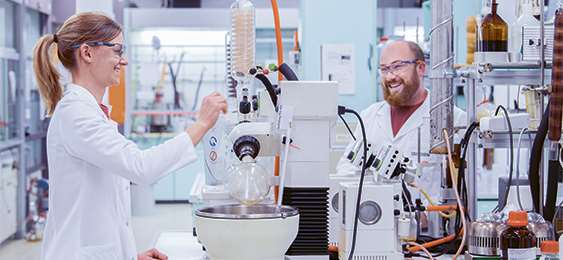Chemistry
Profitability increased despite decline in demand

The coronavirus crisis dampened the demand for products of the Chemistry Division, and net sales for the year declined 6.3 % to CHF 73.3 million. Thanks to rigorous cost controls, however, EBIT was improved to CHF 4.6 million and EBIT margin to 6.3 %.
Strategy
Zeochem has established itself as one of the world’s three leading suppliers in the silicate chemistry field. Each of the Chemistry Division’s four production sites has its own specialization. The US facility manufactures high-value molecular sieves which are used in areas such as concentrating medical oxygen (“medox”). The plant in Bosnia and Herzegovina maintains product lines of molecular sieve powders, of chromatography gels which are employed in pharmaceutical separation processes and of special zeolites which are used to adsorb odours in plastics. The Swiss site supplies deuterated products that are used in analytical procedures and in the manufacture of OLED screens. And the production plant in China manufactures standard molecular sieves which are employed in industrial installations to dry gaseous substances and to remove impurities.
2020 brought the development of a new generation of molecular sieve products for “medox” applications that offer customers an enhanced product performance. The first batches of these have already been trialled and delivered to customers. The Chemistry Division aims to achieve further growth in the high-value product segment and gain additional market share.
The year also saw the compilation of the division’s first-ever “Oekobilanz” environmental audit, based on data from 2019. The new document provides the foundation required to determine the impact of the actions that the division has taken on its products’ environmental footprint. The division has reduced carbon dioxide emissions at its operating sites by some 30% over the past five years, even though its production volumes have increased by more than
50 % over the same period.
Market environment
After an encouraging start to the year and a strong first-quarter performance, the global economy felt the full force of the coronavirus pandemic. Transport and energy were among the sectors hardest hit. Many regions saw their economies brought almost to a standstill for weeks through the lockdown measures imposed. Demand for fuel collapsed, and prices duly slumped. For the first time ever, negative crude oil prices were recorded on the commodities markets. The oil, gas and ethanol sectors – which are among the prime users of molecular sieves – suffered accordingly. Investments in other industrial gas facilities were also halted or deferred. At the same time, as a result of the coronavirus pandemic, the order volumes in the product segment supplying molecular sieves for medical oxygen concentration applications hit new record highs.
The deuterated compounds product segment, by contrast, felt the adverse impact of the actions taken in response to the coronavirus pandemic. Many research laboratories remained closed; and travel restrictions meant that new OLED screen production facilities could not open as planned. As a result of the reduced product demand, short-time working was adopted in autumn 2020 at the division’s Swiss production site.
The coronavirus pandemic made great demands on the personnel responsible in the division’s various product segments, as orders were modified or cancelled entirely. But even in the face of local production restrictions, all customer supply lines were constantly and consistently maintained.
Business development
While sales were increased in the medical oxygen segment, all the division’s other product areas suffered net sales declines, primarily as a result of the coronavirus pandemic. Total divisional net sales for the year amounted to CHF 73.3 million, which was 6.3 % down on 2019. Excluding currency factors, net sales were 0.5 % below their prior-year level.
The division responded to the coronavirus crisis in spring with rigorous cost-saving measures. The encouraging result of all these endeavours is that EBITDA could be maintained at CHF 9.5 million. The EBIT for the year of CHF 4.6 million was even an improvement on the 2019 result, and EBIT margin rose to 6.3 %. The year-end divisional workforce totalled 277 employees, ten fewer than a year before.
Outlook
The global economy is likely to recover somewhat from the coronavirus shock in the course of 2021, and should claw back at least some of the declines that were seen in 2020. This should also prompt a revival in the demand for products of the Chemistry Division. The division plans to invest CHF 11.0 million in tangible fixed assets over the year. An additional deuterium oxide concentration plant should be installed at the Swiss operating site. The US facility will see the construction of a new administrative building to replace office premises that are currently held or leased in four different locations. And the division’s Chinese production site will be provided with a waste-water treatment plant and further operating facilities, for which some 24 000 square metres of adjacent land were recently acquired. The division expects to report slightly higher net sales for 2021 and a correspondingly improved EBIT result.
